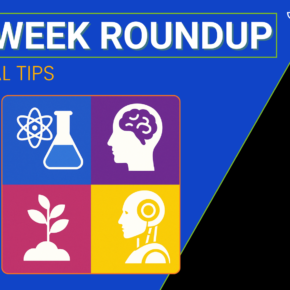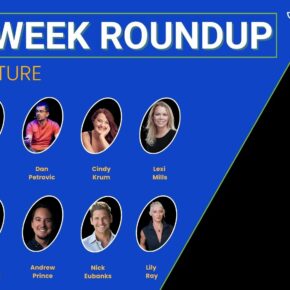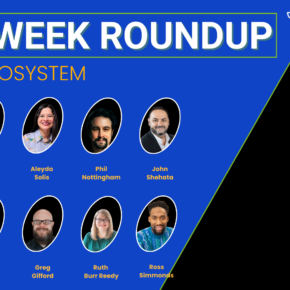
About Crystal Carter
Crystal Carter is the Head of SEO Communications at Wix and an SEO & Digital Marketing professional with over 15 years of experience. Her global business clients have included Disney, McDonalds, and Tomy. An avid SEO Communicator, she hosts SEO webinars and podcasts and her work has been featured at Google Search Central, BrightonSEO, Moz, Lumar (DeepCrawl), Semrush, and more.
Crystal's SEO Week Session
- Title: Diving into Deepseek Generative Search Optimization
- When to Watch: Day 3 | Wednesday April 30th | 1:45 pm
- Session Abstract:
Deepseek is quickly emerging as a major player in generative search. Crystal Carter will break down how this new model works and what it means for search optimization.
- How Deepseek’s generative model differs from traditional search engines
- New optimization strategies for surfacing content in LLM-driven search results
- What brands need to do to stay visible in an evolving search ecosystem
Transcript
Garrett: All right, welcome back to The Next Chapter of Search produced by SEO Week and iPullRank. We are hyped, we got another one of our killer presenters that I’m talking to today, Crystal Carter. Crystal is the head of SEO communications at Wix Studio. Thanks for joining me today, Crystal. What is up?
Crystal: Everything is up. Things are changing. Things are changing and growing and becoming new and kind of still the same again.
Garrett: You are in the weeds and I’m really excited to see what you’ve been unearthing for your presentation. But before we get to what you’ll be presenting about, let’s dive in. Yeah, okay. State of SEO, like you said, lots of things are happening. From your perspective, what is the state of our industry? Like, what are you looking at right now?
Crystal: If I’m completely honest, I think SEO is in beta mode right now. We are in one of the most transformational times the industry has seen in years. And I think that the way that we’ve done SEO traditionally, well, I don’t think that you should throw it out. I think that it’s something that we need to evolve, and we need to evolve now. And people say, “Is SEO dead?” And I’m like, “No, but it is changing.” And if you are still doing SEO the way that you were doing it five years ago, then you’re going to struggle, if I’m completely honest. And I think that anybody who’s still doing checklists and just expecting to collect a check, like they might struggle to get the results that they were seeing before, and they might even struggle to sell it to folks in terms of like clients and the C-suite, etc. etc.
So I think that right now is a great time to pick up some new skills. Right now is a great time to be testing and iterating and paying attention to new opportunities in SEO. And right now is a great time to be talking to other channels as well. And I think that it’s still valuable. It still adds value for users. And we’re able to build on these skills, but we can’t just rely just on the traditional skills that we’ve had.
Garrett: I love that. Can I ask you specifically, why do you think it’s changing? Can you kind of like dig into like, what is changing that the old tactics don’t work?
Crystal: Google’s not the only game in town. If I need an answer to a question, I could go to Google. I could go to Perplexity. I could go to Claude. I could go to Copilot. I could go to Chat GPT. And many, many users are. If you look at the user uptake for these tools, Perplexity is adding like 10 million users or something every couple of months. And they’re lower down. Chat GPT is pulling in around like 87, 90-ish percent of the LLM tool use across the industry. And they have billions. I think we’re approaching 3 billion or more users every month. And it continues to grow. And at that pace, if you are still relying exclusively on Google, then you are missing out on a large number of people who are coming through. And there’s studies coming out regularly about how leads are really good coming from Chat GPT, for instance, and the links are being more consistent. And there’s tools that are developing around this all the time. And we need to be guiding those things.
I think for a while, people were saying, oh, SEO is dead. And Gartner said, oh, search is going to drop by 26%. And all of that sort of stuff. And SEOs were like, oh no, but we’re not helpless. Like, we ruined the internet. We can do anything. So I think that we have tools. And I think that we previously have thought about like crawlability, indexability, rankability. And we now need to think about like retrievability. We need to think about that next element so that we can stay relevant for the brands that we’re working for across every stage of the user journey. And that LLM portion has to be part of the user journey.
Garrett: I love it. Oh man, retrievability is such like, we’re going to be hearing so much more about that, especially in the context of retrieval augmented generation, the way that these LLMs work. Speaking of which, what are you talking about at SEO week? Like give us a little bit of a preview as you formulate your presentation of what people can expect if they attend in New York.
Crystal: I think a lot of people are pontificating about how you can rank and how you can optimize for LLMs. And I will be presenting my findings and my observations and the things that I’ve seen that seem to work. And I have been looking at this space for a while. I think I first got really interested in it because like everybody else, when ChatGPT sort of first blew up, I said, “Hey ChatGPT, who’s Crystal Carter?” And they gave me the Mariah Carey meme where she goes, “I don’t know her.” They gave me that. They were like, “I don’t know who she is.” And I was like, “Cool, I’ll just, yeah, thanks, awesome.” And then a few months later I tried it again and they did know who I was. And I was like, “That’s very interesting. What’s happened between then and now? And that really got me, really got all the gears going.
And I think that we’re in a really, really interesting space in the last four or five months, we’ve seen search GPT blow up. We’ve seen links becoming more commonplace on Gemini. They’re a bit up and down with whether or not they have links all the time, but they’re in there. And, you know, Copilot on 365 has links as well. And Perplexity continues to grow and is a fantastic tool if I don’t say so.
And I think that the way that we position our brands in those tools is absolutely within the wheelhouse of an SEO because all of those search-enabled LLMs have a search engine at the back of them to ground them so that they have more accurate information and to give them more detail. Perplexity recently opened up, you know, they have DeepSeek and you can see the reasoning. It shows you all of the steps that it takes to give you an answer. And it shows which websites they reference. It shows which pages they go to. It shows all of those elements and you can see that. And you can see how it connects through to whether your brand is referenced and whether your brand is visible. And I think that we can take all of the skills that we have from understanding how crawl bots work, from understanding how keywords work, from understanding, you know, how users find information. We have years of knowledge across that.
And even understanding how SaaS is developed is valuable. And I think we can take all of those skills and I think we can apply that to driving brand visibility within these LLMs. And I hope to be able to share some of that.
Garrett: Oh my goodness. It’s so much fun because it really does feel like a wild, wild West where we’re like, you know, ChatGPT, we don’t know the extent to which it completely depends on Bing and it’s like algorithmic ranking signals, whatever. And to what extent it’s even building its own. Perplexity is very much a black box and there are all these platforms for us to figure out. From your experiments up until this point, what is one practical, actionable thing that people can start doing right now to improve their visibility?
Crystal: If you are using a search-enabled web builder or sorry, search-enabled LLM, then you need to give feedback on inaccurate responses. And you need to give feedback very clearly. And it’s something that they all ask for. If you look up the Gemini information, it will say, give us feedback on all of our information. Let us know what’s going on. If you see inaccurate information, like verifiably inaccurate, like if it says that like, the CEO of Betty Crocker is Kim Kardashian, you can go, no, it is not. And you could go thumbs down and give them feedback. And that will give you results. And when you check it again, it will be more accurate. And that’s something that anyone can do regardless of any tool set.
Garrett: Oh my goodness, that’s so good. I mean, I haven’t heard enough people actually recommend just go in and clicking that feedback. Great tip. Now, what’s next, Crystal? Like the whole SEO, there’s so many directions and nobody knows definitively, but what direction do you think SEO will be going for the next stage of search?
Crystal: I think that the act of optimizing for LLMs is something that is going to be core to SEO within the next element or sort of the next few years, because the use of LLMs and the use of chat, chat, you know, sorry, generative search and those chat bots and those chat assistants is only going to increase. So, we need to make sure that we have brand visibility across those things. What I think is really interesting is how we’re going to do that.
I hear a lot of people who are like, skyscraper content is over. And I’m like, I mean, maybe, but actually what people forget is that those large language models need language, they need words in order to model their responses. So if you don’t have content on your brand that’s talking about what you do, then there’s nothing for them to use to model their responses on you. And if somebody else is writing on it, then guess what? That will be the information that shows on there. So I don’t necessarily think that skyscraper content is over. Also, there’s so many tools like Notebook LM, which I just absolutely love. Notebook LM will take that skyscraper post and then it becomes the knowledge base for whatever thing the person’s working on. And if you have a comprehensive piece of content on whatever topic, then that’s something that they can use to reference and they can use it as information. And that’s incredibly, incredibly valuable for a brand.
So I think that we are going to have to rethink what content is for and what it does for a brand. And I think we’re also going to need to rethink how and why we take the steps that we do. So link building is still important, but where? It’s not just link building for the sake of link building, not just quantity’s sake, but being strategic about which links are going to actually move you forward in the conversation around the particular topic. We can think about clustering, of course, but that needs to be thought about in terms of like how that flows with the user journey that somebody might have on an LLM, for instance, about whatever your topic is.
So I think that we are going to need to evolve our tools to not just be, you know, just Google and just the plain blue links. And I think, you know, we might have to, you know, just accept the plain blue links maybe aren’t the only game in town, though we have loved them for a long time, they have served us well. You know, there’s other fish that we can go after. And I think that we need to evolve with some of those things and maybe not hold so tightly to some of the things that have, you know, done us so well in the past.
Garrett: I love it. It’s so interesting. It’s just so much a mental shift. A lot of stuff is the same, you know, relevance, authority, even user behavior still matters. It’s just the way that it’s going to be discovered is going to change the way that people interact. Crystal, thank you so much. For those of you who haven’t already got your ticket, we’re talking April 28th to May 2nd, New York City. Crystal will be dropping some knowledge along with everyone else, all of our amazing 40+ speakers at SEO Week. Check us out. My name is Garrett Sussman of iPullRank, and hopefully we’ll see you there. Bye-bye.



